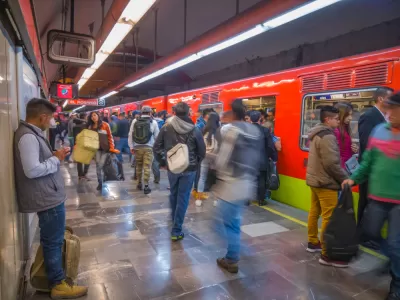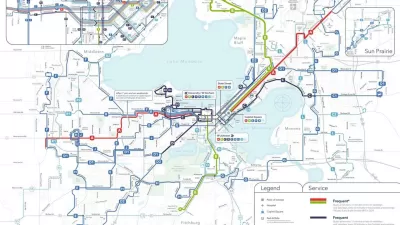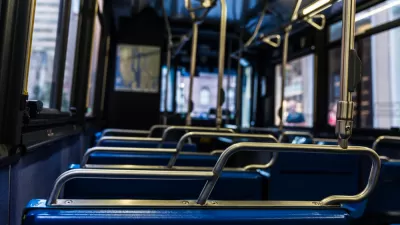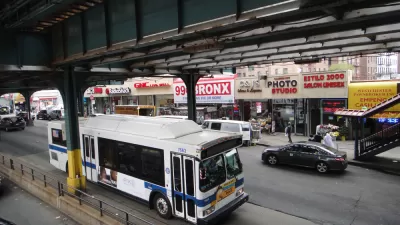It's a popularity contest, sure, but it's our popularity contest.

The American Planning Association's Transportation Planning Division recently announced the Transit Bracket Challenge 2019.
According to the website hosting the bracket challenge, the agencies were selected based on reported ridership and metro area populations. (Sorry, Phoenix. Maybe if you hadn't gutted your light rail plan you'd get to play.)
All it takes is one click to participate in Round One of voting, which runs until May 19 and pits transit agencies against each other in eight matchups. Round Two starts May 20.
It seems there is a seeding system at work, just like the real March Madness, because the oldest and largest systems are not facing off yet. Here are the first round matchups:
- MTA (New York) versus Metro (Houston)
- CTA (Chicago) versus MTS (San Diego)
- Metro (Los Angeles) versus MDT (Miami)
- MBTA (Boston) versus RTD (Denver)
- WMATA (D.C.) versus TriMet (Portland)
- SEPTA (Philadelphia) versus MTA (Baltimore)
- NJTransit (Newark) versus MARTA (Atlanta)
- Muni/SFMTA (San Francisco) versus King County Metro (Seattle)
For my money, the most compelling matchups of round one are Philadelphia versus Baltimore and San Francisco versus Seattle, but the contest promises more fireworks in later rounds. One imagines a scene out of Anchorman: The Legend of Ron Burgundy (2004) when or if New York and Chicago face off.
While this whole exercise is clearly intended to be fun, to inspire local pride, and to raise awareness about the acronyms behind public transit in cities far away, it could also force a lot of transit riders and civic enthusiasts to reckon with where and when they ally with the local transit agency. As a transit user myself, I oscillate between system evangelism (seriously, I should get a cut of the fare box, Metro Los Angeles) and just spewing rage tweets about service (seriously, I should get 10 minute headways and signal prioritization, Metro Los Angeles).
How people feel about riding transit, and the messages they send to the world about riding transit, gets at a fine line between civic pride and civic duty, I think. Many pro-transit urbanists, I think, would never say anything bad about the city they love, but also probably don't ride transit enough to learn to hate it at times. Or the transit system is a signifier of a cause to which they are unequivocally committed: their city.
On the flip side, many of these transit agency's fiercest critics will soon find themselves in the awkward position of repeatedly supporting the agency they love to hate (or is it hate to love?) out of civic pride.
For other people, riding transit is about being a good citizen—about living in public, interacting with their neighbors, and embodying the type of city and community they would choose for the world. I imagine that it will be hard to chose from this list. Something about the "lesser of two evils"? (Hey! This isn't March Madness! This is a presidential election!)
It's too bad we won't get this extra layer of demographic insight in addition to a winner with this contest:
- Are you a planner?
- Are you a regular transit user?
- Do you consider yourself a civic booster or a good citizen?
- How many of these transit systems have you ridden?
- How many transit systems you have ridden in other countries?
- Do you want to ban cars?
- Are you a NIMBY?
- Are you a YIMBY?
- Are you a PHIMBY?
I'll tell you : I'm a journalist, who uses buses for 80 percent of my trips, and rail for 10 percent of my trips. I do not consider myself a civic booster, but I love my city, and I try to be a good citizen. I've ridden nine of these systems. (I'm taking the fifth on the rest of those questions.) I'll be voting for the system with the most high frequency lines, running the most trains and buses at off-peak hours, and with the most priority given to transit in the public realm.
Unfortunately, Mexico City isn't on the list.

Alabama: Trump Terminates Settlements for Black Communities Harmed By Raw Sewage
Trump deemed the landmark civil rights agreement “illegal DEI and environmental justice policy.”

Planetizen Federal Action Tracker
A weekly monitor of how Trump’s orders and actions are impacting planners and planning in America.

The 120 Year Old Tiny Home Villages That Sheltered San Francisco’s Earthquake Refugees
More than a century ago, San Francisco mobilized to house thousands of residents displaced by the 1906 earthquake. Could their strategy offer a model for the present?

In Both Crashes and Crime, Public Transportation is Far Safer than Driving
Contrary to popular assumptions, public transportation has far lower crash and crime rates than automobile travel. For safer communities, improve and encourage transit travel.

Report: Zoning Reforms Should Complement Nashville’s Ambitious Transit Plan
Without reform, restrictive zoning codes will limit the impact of the city’s planned transit expansion and could exclude some of the residents who depend on transit the most.

Judge Orders Release of Frozen IRA, IIJA Funding
The decision is a victory for environmental groups who charged that freezing funds for critical infrastructure and disaster response programs caused “real and irreparable harm” to communities.
Urban Design for Planners 1: Software Tools
This six-course series explores essential urban design concepts using open source software and equips planners with the tools they need to participate fully in the urban design process.
Planning for Universal Design
Learn the tools for implementing Universal Design in planning regulations.
Clanton & Associates, Inc.
Jessamine County Fiscal Court
Institute for Housing and Urban Development Studies (IHS)
City of Grandview
Harvard GSD Executive Education
Toledo-Lucas County Plan Commissions
Salt Lake City
NYU Wagner Graduate School of Public Service






























